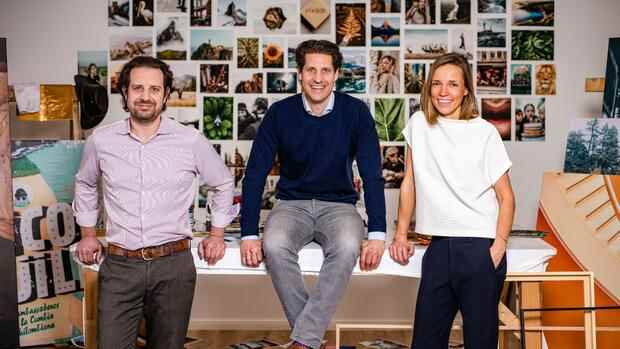Marc, René and Anna Ruhland (from left to right) run the start-up for photo and poster printing together.
Munich Many people used the lockdown to take a look at their own memories. At the very beginning of the corona pandemic, they sorted their photo collections and ordered pictures and photo books, recalls Anna Ruhland, Managing Director of Myposter. “Demand has exploded from all providers!”
Business has meanwhile returned to normal. When people travel less and there are fewer festivals, fewer new photos are added. But thanks to the Corona boost and a takeover since 2018, Myposter has more than tripled its sales from less than 30 million euros to an estimated almost 100 million euros this year.
The goals of the start-up remain ambitious: “In ten years we certainly want to have more than twice as much sales,” announced founder René Ruhland in an interview with the Handelsblatt.
At the beginning of the year, Myposter made the largest acquisition in the company’s history and took over Juniqe. The Berlin company specializes in prints and posters by artists. The Ruhland’s acquired the company, which recently had a turnover of 22 million euros, in the tens of millions. René is confident that the acquisition will quickly pay off. Because Juniqe has so far had the printing done externally, this can be done in the two Myposter production facilities in the future.
Top jobs of the day
Find the best jobs now and
be notified by email.
The daughter Kartenliebe should also grow. Myposter has only recently started offering wedding and birthday cards with customer photos there, for example. Sales are expected to triple this year in competition with the industry giants Kartenmacherei and Sendmoments.
Growth without external investors
Myposter was founded in 2011 by René Ruhland and his brother Marc Ruhland. Both had previously imported art prints from China with their joint venture RMR Art Company, which they sold in furniture stores. However, they saw even greater market potential in the business of digital photos, which are mainly taken with cell phones. In 2011, the brothers therefore started Myposter. Two years later, René Ruhland’s wife Anna stepped in and took care of issues such as finance and production. Marc is responsible for IT and purchasing.
At the time the company was founded, there were still many suppliers on the market. “We produced our own right from the start, so we were always able to offer the same prices as the big ones,” says René Ruhland. In addition to quality and delivery time, it is important that the configurator is easy to use. The market has since consolidated. The big providers like Myposter, Cewe, PosterXXL and Pixum have remained.
Particularly noteworthy: Myposter was able to establish itself on the market without external investors. The enormous growth was achieved from within. “The urge for freedom runs deep within us,” says founder René Ruhland. “It’s very appealing to always be able to make your own decisions.” Myposter has also been profitable on the bottom line for ten years and wants to continue to grow.
The big vision: Every new picture on the wall and every photo card in Europe should be created with the help of Myposter – be it through a direct order or through the provision of software and infrastructure for other providers. But there is still a long way to go: in 2021, the big competitor Cewe sold its 75 millionth photo book in total around 16 years after the offer started in Great Britain and sees itself as the market leader in this field in Europe.
“The performance concept is important to us”
Like its competitors, Myposter’s business model is digital. Customers can upload their photo files and order calendars and photo books. The basic idea is very traditional, says Anna Ruhland. “People have been making photo albums for 100 years.”
The entrepreneurial self-image of the family company is also conservative. “The performance concept is important to us,” says the founder. If an applicant first asks about time off and bonuses, she is suspicious. “We are looking for employees with a high level of intensity and a great intrinsic motivation to move forward and win,” adds René Ruhland.
So far, the company has not had any staff shortages, and fluctuation among the 340 employees is low. The working conditions are modern with part-time opportunities and understanding when the children need to be looked after. The first thing every new office worker does is get to know all the other 240 employees outside of production personally. There is coffee, fruit and beer. “But if the employees keep asking for new benefits, then there are also limits,” says Anna Ruhland.
The two owners have four children themselves and do endurance sports, working at the limit. René recently reported to “Manager Magazin” how it had affected his health at times. “But you also get a lot of satisfaction and happiness from work,” he says.
More: How the new Pinterest boss wants to trim the platform for profit
